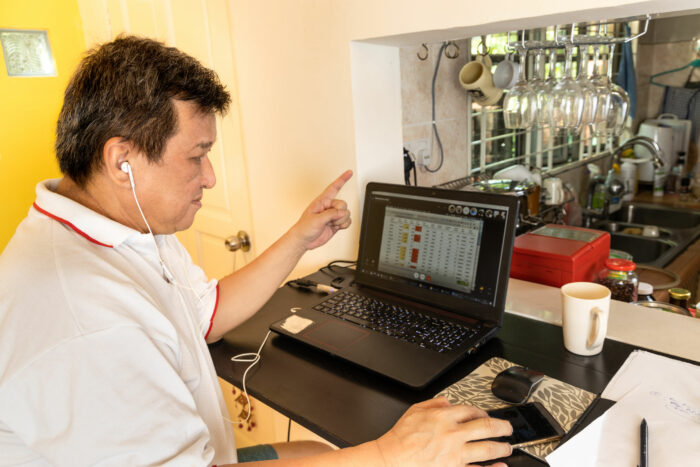Rethinking employee engagement and wellbeing for a hybrid workforce

HR Tech Fest Connect 2021 will provide key insights into how organisations can more effectively manage their employees’ mental health and wellbeing.
WFH as default to stop COVID-19 in India, says industry body

Firms should review operations and minimise the use of in-person manpower, limiting it to critical operations or activities required by law.
Australia sees rise in telework despite easing restrictions

Larger businesses were twice as likely to have introduced remote working arrangements in response to COVID-19 as compared to smaller firms.
Singapore cuts back number of staff allowed in the office

In an effort to curb the spread of COVID-19, employers need to reduce the number of staff in the office from the current 75% back to 50%.
What’s next for the future of work: Building a futureproof workforce

Organisations can build futureproof workforces by leaping forward in iterative ways and, strengthening the skills and capabilities that are critical for success.
Japan incentivises migration out of Tokyo without staff changing jobs

The government is encouraging workers to relocate to less-populated areas of the country while still employed by businesses based in Tokyo.
Building mental resilience critical to tackle WFH-led mental stressors

A campaign will be held in September by healthcare institutions and agencies in Singapore to share best practices on how to build workers’ mental resilience.
Singapore launches tripartite standard for work-life balance

To help workers achieve a better work-life balance, the Tripartite Standard on Work-Life Harmony (TSWLH) has been launched.
How to succeed in the era of hybrid workforce management

HR Tech Fest Connect 2021 will provide key insights into how HR leaders can be successful in a new era of hybrid workforce management.
WFH in Japan limited to office workers, survey finds

Staff working from locations other than their offices accounted for 19.2% of all workers in Japan in April, which is almost unchanged from levels in July 2020.
Indian government advises staff to WFH

Various departments have asked their employees to report at staggered timings, while those living in COVID-19 containment zones are told to stay home.
Thailand advises those in high-risk areas to work from home for 2 weeks

The Ministry of Public Health’s advisory comes as the number of COVID-19 cases are expected to spike after the Songkran festival.
Australia gives cash incentive for unemployed to relocate for work

To incentivise job seekers to move to new locations for work, the government is giving them an upfront cash payment of A$2,000 (US$1,539).
HR Tech Fest Connect 2021 brings organisations into the future of work

At HR Tech Connect 2021, HR visionaries and experts like Anita Lettink and Josh Bersin will address the key priorities facing HR leaders in 2021.
35% of 2020 job openings in Singapore were for remote work

MOM has reported that 35% of job vacancies last year could be done remotely, adding that these openings were largely for PMET roles.
Facilitating peer-to-peer collaboration for a better employee journey

CHROs need to provide staff with innovative digital tools for better cross-functional and cross-border peer-to-peer collaboration.
Mumbai orders WFH amid COVIF-19 case surge

All non-essential services like malls, beauty salons and places of worship were ordered to shut operations from Monday.
Innovate in the face of uncertainty

A new eBook from Indeed highlights why now is the right time for organisations to review their hiring strategies, despite the prevalence of economic uncertainty.
Google prioritises in-person collaboration with office reopening

Google is reopening some of its US offices with employees returning to the office on a voluntary basis from April.
More workers in Malaysia to return to the workplace from April

The level of office attendance for civil servants is subjected to the Public Service Department, while the private sector is allowed to have 100% of staff back.
Malaysia amending employment law to cater for WFH

The government is proposing a change to the current employment law to support a work-from-home (WFH) culture even in the post-pandemic era.
Singapore adopts flexible and hybrid work model

Remote working will be scaled down in the South-East Asian country as more employees are allowed to return to the workplace.
Workplace redesign on the cards for Singapore’s financial institutions

To prepare for workplaces in a post-COVID era, banks and financial institutions are redesigning their workplaces and adopting flexible work arrangements.
Leading change through an emphasis on driving the human experience

Through a new webinar series, SAP SuccessFactors will examine how CHROs can drive both workplace digital transformation and employee experience.
Malaysia extends WFH accident coverage

Since last year, workers from various sectors have had to work remotely to comply with government measures to contain the spread of COVID-19.
From novelty to transparency

Brent Colescott, Senior Director, Global Business Strategy & Transformation, SumTotal Systems, explains why the pandemic may have brought about the path to organisations’ true learning destiny.
A year after lockdown: 5 ways that the world of work has changed for good

A look at HR since businesses sent millions of workers home with little more than a good-luck wave and a laptop.
Cambodia trials work-from-home for one week

Prime Minister Hun Sen has issued a directive for all government institutions and the legislative body to adopt work-from-home practices for one week.
WFH to remain as default as Malaysia loosens movement control restrictions

The government has replaced the Movement Control Order (MCO) in Selangor, Kuala Lumpur, Johor and Penang to a conditional MCO (CMCO).
Staggered working hours and remote working encouraged in Singapore

Spreading out commuter crowds on buses and trains during peak hours would help ensure the financial sustainability and efficiency of public transport.

